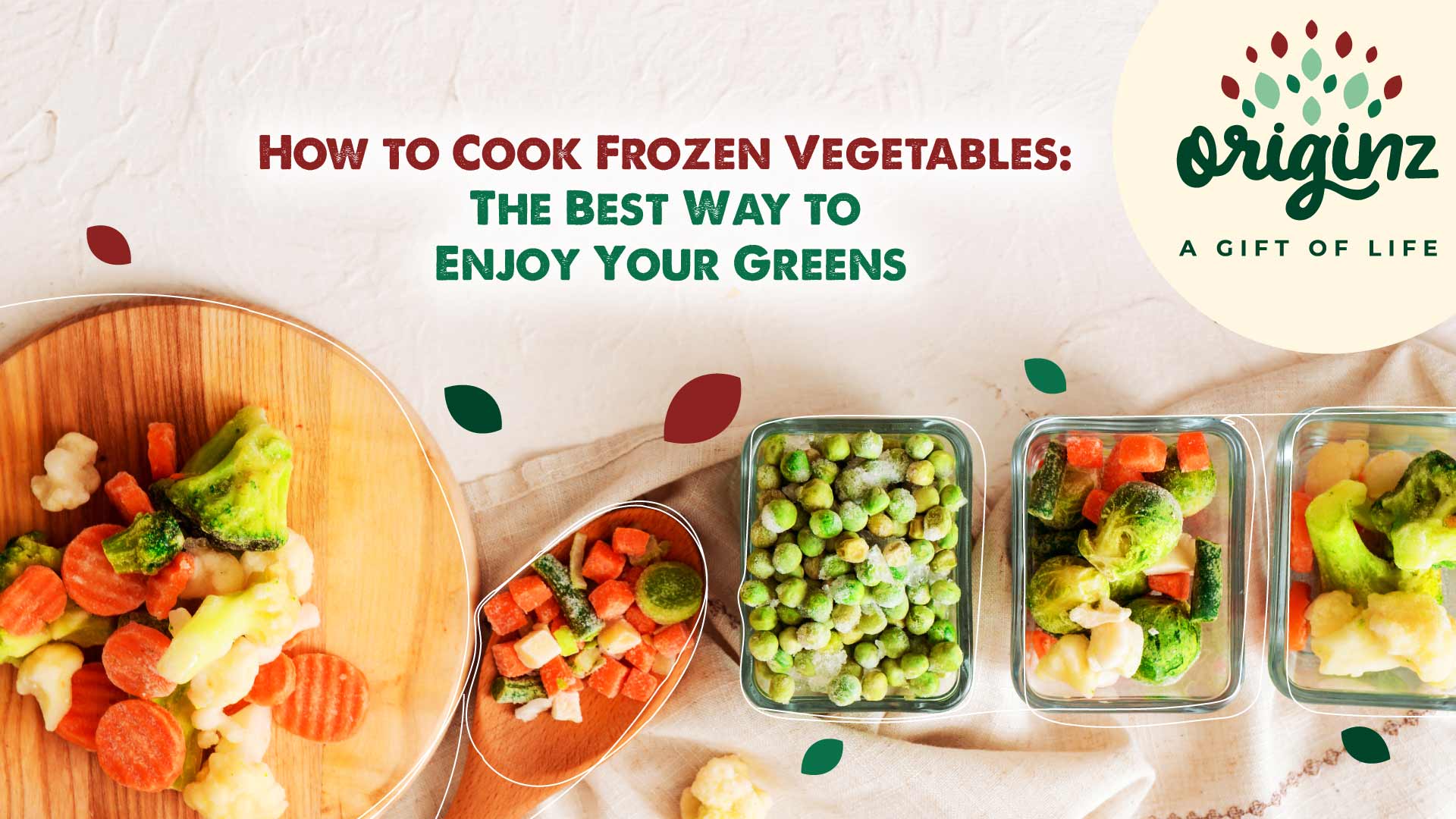
How to Cook Frozen Vegetables: The Best Way to Enjoy Your Greens
Frozen vegetables are a convenient and nutritious addition to your kitchen, offering a quick and easy way to prepare wholesome meals. They're a perfect solution for busy individuals or those who want to have a variety of veggies readily available without worrying about spoilage. In this blog, we will explore the world of frozen vegetables, highlighting the benefits of frozen fruits and vegetables and sharing the best ways to cook them. So, let's dive into the art of cooking frozen vegetables!
Benefits of Frozen Fruits and Vegetables
Before we delve into the specifics of cooking frozen vegetables, let's briefly touch upon the numerous benefits they offer. Frozen vegetables are picked at their peak ripeness, which ensures that they are packed with essential vitamins and minerals. This locking-in of nutrients makes them a healthy choice, often on par with, if not better than, their fresh counterparts. Moreover, they have a longer shelf life, reducing food waste and saving your money.
Frozen vegetables, such as frozen mixed vegetables, are incredibly versatile and can be used in a wide variety of dishes. You can easily incorporate them into soups, stews, casseroles, and stir-fries. Their convenience and extended shelf life make them a valuable addition to any kitchen.
Frozen Vegetable Recipes
There are many ways to prepare delicious dishes using frozen vegetables. From steaming and microwaving to sautéing and boiling, your options are endless. But one of the most flavourful and nutritious methods is roasting frozen vegetables.
Roasting Frozen Vegetables
Roasting frozen vegetables is a simple yet effective technique that enhances their natural flavours and textures. Here's how you can do it:
Ingredients:
Your choice of frozen vegetables
Olive oil
Salt and pepper
Optional seasonings like garlic powder, thyme, or rosemary
Instructions:
Preheat your oven to 425°F (220°C) and place a baking sheet in the oven to heat.
While the oven is preheating, take your frozen vegetables and place them in a large bowl.
Drizzle a bit of olive oil over the vegetables and season with salt and pepper. Add any optional seasonings for extra flavour.
Carefully remove the hot baking sheet from the oven and spread the frozen vegetables evenly across it. This sizzling start helps to create a crisp texture on the veggies.
Roast the vegetables in the oven for about 20-25 minutes, or until they are tender and slightly caramelized. Be sure to stir them once or twice during roasting to ensure even cooking.
Once they're done, remove the vegetables from the oven and let them cool for a few minutes. Then, serve your delicious roasted frozen vegetables as a side dish or use them as an ingredient in other recipes.
The Best Way to Cook Frozen Vegetables
Roasting is undoubtedly the best way to cook frozen vegetables, but you can also try other cooking methods, such as steaming, sautéing, or boiling, to suit your preferences and the dish you're preparing. Experimenting with various techniques can help you discover new flavours and textures to enjoy.
Frozen Mixed Vegetables
Frozen mixed vegetables are a fantastic addition to your freezer because they offer a blend of different veggies in one convenient package. This variety allows you to create dishes with a colourful array of flavours and textures. Whether you're making a hearty vegetable soup or a vibrant stir-fry, frozen mixed vegetables save your time and add diversity to your meals.
FAQs
Q: Are frozen vegetables as healthy as fresh ones?
A: Yes, frozen vegetables are often as healthy, if not more so, than fresh vegetables. They are typically frozen at their peak ripeness, preserving their essential nutrients.
Q: Can I cook frozen vegetables without thawing them first?
A: Yes, you can cook frozen vegetables without thawing them. In fact, cooking them from frozen can help preserve their texture and flavour.
Q: How can I add more flavour to my roasted frozen vegetables?
A: To add more flavour, consider using various seasonings like garlic powder, herbs, or a sprinkle of grated Parmesan cheese. Experiment with different combinations to suit your taste.
Q: Can I refreeze any leftover cooked frozen vegetables?
A: It is generally safe to refreeze cooked frozen vegetables, but their texture and taste may not be as good as when they were first cooked. It's better to consume them within a few days or use them in soups and stews.
Cooking frozen vegetables can be both a convenient and delicious way to incorporate more greens into your diet. Whether you choose to roast them for that extra burst of flavour or use them in various recipes like soups and stir-fries, frozen vegetables are a versatile and nutritious addition to your meals. So go ahead, make the most of frozen vegetable recipes, and enjoy the benefits of their convenience and long shelf life. Your taste buds and your health will thank you!
Further Read,
Latest Blogs

Maintaining Healthy Habits After Ramadan
Have Ramadan healthy meals after Ramadan and maintain healthy food habits and implement them in your daily lives. Read more about healthy food habits.

Authentic Middle Eastern Iftar Meals to Prepare This Ramadan
Prepare some authentic middle eastern iftar meals this Ramadan. Look for fresh Ramadan food ideas and make your day memorable with these dishes. Check them out.

Ramadan Dishes to Cure Fasting Fatigue
Don’t worry about fasting fatigue anymore as we have listed some best Ramadan dishes and easy iftar meals to support your fasting journey. Check them out.

Eid-al-Fitr Feast: Delicious Recipes to Celebrate the End of Ramadan
Celebrate the end of Ramadan with delicious recipes on the eve of Eid ul Fitr. Read more about the traditional Ramadan recipes and make them easily.